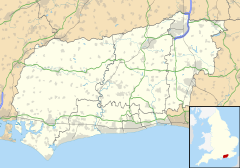Horsted Keynes
| Horsted Keynes | |
|---|---|
 |
|
| Horsted Keynes shown within West Sussex | |
| Area | 15.81 km2 (6.10 sq mi) |
| Population | 1,507 2001 Census 1,586 (2011 Census) |
| • Density | 95/km2 (250/sq mi) |
| OS grid reference | TQ387278 |
| • London | 32 miles (51 km) N |
| Civil parish |
|
| District | |
| Shire county | |
| Region | |
| Country | England |
| Sovereign state | United Kingdom |
| Post town | HAYWARDS HEATH |
| Postcode district | RH17 |
| Dialling code | 01825 |
| Police | Sussex |
| Fire | West Sussex |
| Ambulance | South East Coast |
| EU Parliament | South East England |
| UK Parliament | |
| Website | http://www.horstedkeynes.com/ |
Horsted Keynes is a village and civil parish in the Mid Sussex District of West Sussex, England. The village is about 5 miles (8 km) north east of Haywards Heath, in the Weald. The civil parish is largely rural, covering 1,581 hectares (3,910 acres), and has a population of 1,586 (2011 census) (increased from 1,507 in 2001). The Prime Meridian passes about 1 mile to the east of the village of Horsted Keynes.
Guillaume de Cahaignes, a French knight who had landed with William the Conqueror and fought at Hastings, and Lord of the Manor of what is now Cahagnes, was given Milton in Buckinghamshire and the Sussex village of Horstede (The Place of Horses in Saxon) which became Horstede de Cahaignes and in time Horsted Keynes. The place name is first attested in the Domesday Book of 1086. The village has been formally twinned with the Normandy village of Cahagnes since 1971. The Horsted Cahagnes Society promotes social and cultural links, and organises annual exchange visits between the two places.
On Saturday, 28 August 1624, Horsted Keynes hosted what is believed to be the earliest known organised cricket match in Sussex. Knowledge of it stems from the death thirteen days later of Jasper Vinall, on whom an inquest was held. He had suffered a head injury during the game when accidentally hit by the bat. As Vinall came from West Hoathly, it is assumed that the event was a village cricket match between the two parish teams.
Two months before being assassinated, U.S. President John F. Kennedy slept in the parish when he stayed one Saturday night at Birch Grove, the home of the former Prime Minister, Harold Macmillan. The American Secret Service closed the village that night, siting their communication hub in the Lounge Bar of The Crown Inn.
On 1 July 2003 a lightning bolt struck the electricity pole beside The Crown public house on the village green which has stood there for at least 300 years and probably much longer. The roof and much of the building were destroyed in one of the largest fires in the area for many years. Fortunately the fire did not spread to the petrol storage tanks of the adjacent Crown Garage. In May 2007 a telephone pole was struck, removing communications from much of the village. Several homes in Lewes Road were left without a telephone service for over one month whilst permission was sought to dig on private land to relay a cable.
...
Wikipedia

